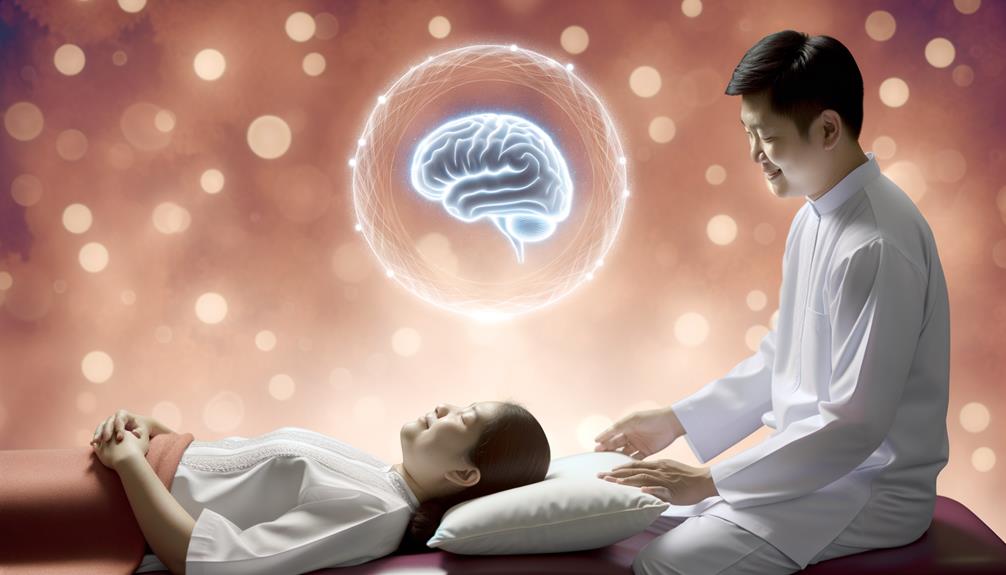You might be surprised to learn that a chiropractor could play a role in managing anxiety. It's not just about spinal adjustments; they often incorporate holistic approaches that address both physical and psychological aspects. By reducing muscle tension and lowering cortisol levels, chiropractic care can promote overall relaxation. But how exactly does this work, and what specific techniques do they use? Can these methods really complement traditional anxiety treatments? These questions open up a fascinating conversation about the potential benefits that go beyond conventional chiropractic care.
Contents
Understanding Anxiety
When it comes to understanding anxiety, it is vital to recognize that it is a natural response to stress, often triggered by various factors such as fear of future events or new experiences like moving or job changes. Anxiety manifests in diverse ways, including panic attacks, phobias, and post-traumatic stress disorder (PTSD), all of which can greatly impact daily functioning.
The physical symptoms of anxiety are varied and can include a rapid heartbeat, upset stomach, and persistent headaches. These symptoms arise from the body's response to stress, which can be particularly debilitating when experienced chronically. This ongoing state of worry not only affects mental health but can also lead to secondary health issues such as depression and physical aches and pains. As a result, managing stress is vital for overall wellness.
A thorough approach to managing anxiety often involves evaluations that include physical, mental, and psychological assessments. This multi-faceted evaluation helps healthcare professionals determine the most effective strategies to reduce anxiety. Chiropractic treatments can play a role in this holistic approach. By focusing on the alignment and proper functioning of the spine and nervous system, chiropractic care may help in managing stress and reducing physical symptoms associated with anxiety.
Engaging with a healthcare professional, such as a chiropractor, can be beneficial in creating a tailored plan that addresses both the mental and physical aspects of anxiety. This integrated method underscores the importance of considering the whole person, not just isolated symptoms, in the pursuit of overall wellness and effective anxiety management.
The Mind-Body Connection

The mind-body connection, a fundamental concept in holistic health, underscores how psychological states like stress and anxiety can manifest in physical forms such as muscle tension and inflammation. When you're stressed, your body releases cortisol, which can exacerbate physical health issues. This intricate relationship between your mind and body means that managing stress and anxiety effectively can also lead to tangible improvements in your physical well-being.
Chiropractic care recognizes this connection and focuses on holistic treatment approaches. By performing spinal adjustments, chiropractors aim to enhance nervous system function, which can help reduce muscle tension and alleviate some anxiety symptoms. Research has shown that the following benefits are associated with a healthy mind-body connection:
- Reduced Muscle Tension: Spinal adjustments can help relax muscles, which in turn can decrease physical manifestations of stress and anxiety.
- Improved Nervous System Function: Enhanced spinal health can optimize nerve function, which is essential for both physical and mental health.
- Alleviation of Inflammation: Chiropractic care can mitigate inflammation, a common physical symptom of stress.
- Overall Health Improvement: By addressing both physical and mental aspects, chiropractic treatments can contribute to your overall well-being.
Understanding the mind-body connection is vital for effective treatment of anxiety. Chiropractors often emphasize this connection in their practice, aiming to restore balance and improve overall health. By addressing the physical symptoms through spinal adjustments, chiropractic care can enhance the mind-body connection, which may lead to reduced anxiety levels and improved mental health. Effective stress management strategies, including chiropractic care, can therefore serve as an extensive treatment for anxiety, promoting both mental and physical well-being.
Chiropractic Care Benefits

Chiropractic care offers multiple benefits for those struggling with anxiety, primarily through techniques that reduce muscle tension and promote relaxation. You might be surprised to learn how chiropractic care can help alleviate anxiety and depression by focusing on the body's physical state. Spinal adjustments are a key component of chiropractic treatment, which can reduce stress by lowering cortisol levels, the primary hormone associated with the body's stress response.
Studies have demonstrated that regular chiropractic treatments can enhance blood circulation and improve oxygen flow to the brain. This physiological improvement contributes to a better mental state, providing you with increased mental clarity and emotional stability. When your body and mind are aligned, you're more likely to experience a reduction in anxiety symptoms.
Another significant benefit of chiropractic care is the holistic approach practitioners often take. Chiropractors don't just focus on spinal adjustments; they also incorporate various relaxation techniques and lifestyle counseling into their treatment plans. This all-encompassing approach can improve your overall well-being by addressing both physical and mental health elements.
Patient testimonials frequently highlight the effectiveness of chiropractic care in reducing anxiety levels. Many individuals report feeling more relaxed and experiencing fewer anxiety symptoms after undergoing chiropractic treatment. This evidence supports the idea that chiropractic care can be a valuable complementary treatment for anxiety.
Techniques Used by Chiropractors

Addressing anxiety through chiropractic care involves a variety of specialized techniques aimed at both physical and mental well-being. These methods are meticulously designed to tackle anxiety symptoms by focusing on the intricate connections between the body and mind.
- Chiropractic Adjustments: These manual therapies primarily target spinal health, aiming to improve alignment and reduce nerve irritation. Misalignments can exacerbate the body's stress response, thereby intensifying anxiety symptoms. By correcting these, chiropractors help to foster a sense of physical balance and mental calm.
- Soft Tissue Therapy: Techniques such as massage and myofascial release are employed to alleviate muscle tension and enhance circulation. This not only reduces physical discomfort but also promotes relaxation, providing considerable relief for those grappling with anxiety.
- Exercise Recommendations: Chiropractors often integrate tailored exercise and lifestyle suggestions into treatment plans. Regular physical activity is essential for overall wellness, and it can notably mitigate stress. These recommendations are designed to complement the physical adjustments, ensuring a holistic approach to anxiety management.
- Nutritional Counseling: Diet plays a vital role in both physical and mental health. Chiropractors may offer guidance on nutrition to address dietary factors that contribute to inflammation and anxiety. A well-balanced diet supports overall wellness and can be a key element in managing anxiety.
Moreover, chiropractors may teach relaxation techniques, such as deep breathing exercises, to bolster the effectiveness of their treatments. By integrating these various approaches, chiropractic care aims to provide a thorough strategy for reducing anxiety and promoting overall health.
Complementary Therapies

When managing anxiety, incorporating complementary therapies can greatly enhance the effectiveness of chiropractic care. By integrating these additional interventions, you can target anxiety symptoms from multiple angles, thereby optimizing overall mental health and well-being.
One notable complementary therapy is massage therapy. This modality works synergistically with chiropractic adjustments to relax muscles and improve circulation. These physiological changes not only alleviate physical tension but also contribute to stress reduction, creating a more thorough approach to managing anxiety.
Mind-body techniques like meditation can be particularly effective when combined with chiropractic treatments. Research indicates that meditation enhances relaxation and stress reduction, amplifying the calming effects of chiropractic care. This dual approach addresses both the mental and physical aspects of anxiety, promoting a more balanced state of mind.
Regular exercise is another essential component. Exercise is known to boost endorphin levels, which can greatly improve mood and reduce anxiety symptoms. When combined with chiropractic adjustments, exercise helps maintain physical alignment and overall well-being, offering a holistic solution for anxiety management.
Nutritional modifications also play a key role. Chiropractors often advise dietary changes that can target inflammation and other dietary factors linked to anxiety. By making these nutritional adjustments, you can support better mental health and enhance the effectiveness of chiropractic treatments.
Lastly, integrating lifestyle changes such as improved sleep hygiene and stress reduction techniques can greatly bolster the benefits of chiropractic care. Adequate sleep and effective stress management are essential for maintaining mental health and reducing anxiety symptoms, making them valuable additions to your anxiety management plan.
Conclusion
To sum up, a chiropractor can indeed help manage anxiety by addressing both physical and psychological aspects. Through spinal adjustments, they reduce muscle tension and cortisol levels, promoting relaxation. Incorporating holistic approaches like exercise, nutritional counseling, and relaxation techniques further supports mental health. By improving the mind-body connection, chiropractic care provides a valuable, evidence-based component in a thorough anxiety management plan. It's a multifaceted approach that complements traditional treatments effectively.
